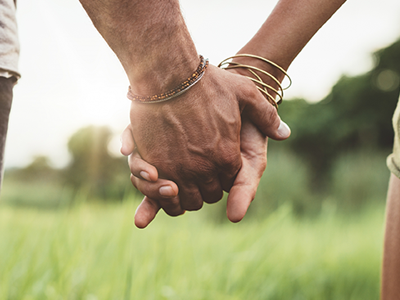At 16 years old, I fell madly in love.
We were inseparable, dramatic romantics, and within a few months of our first kiss, everything I did was with this boy in mind. I was constantly coming up with new little ways to show him how much I loved him, I would try to guess what he wanted and needed before he asked for it, and I thought of him and his desires day and night.
What I didn’t see, however, was how through these million tiny “romantic” choices and actions, parts of what made me “Me” were slowly eroding, and I was losing sight of who I was and what I needed and wanted.
Although that boy and I broke up, for many years I repeated the same pattern in other relationships. I would fall in love, allow myself to get swept away, and eventually feel like I had lost all sense of myself. Over time, I started to notice how many of my female friends and clients seemed to experience something similar in their relationships.
Despite having good relationships with good partners, after every single break-up I found myself hurtling through a warp-speed blast of growth and reinvention. In short, once I was single I would “find myself” again.
It was as though the only time I ever felt truly free and “whole” was when I was single, because being alone allowed me to fortify my own self identity.
Only being single allowed me to recognize and act on my own needs and desires fully, without running them through a love-induced filter. Learning the skill of loving and nurturing myself (while single) ultimately made me feel more cared for, loved, and empowered than I had felt in any relationship.
Why do so many women feel like they lose themselves in their relationships?
My personal theory is that many of us allow our relationships to dictate the direction of our development.
Many of us learn early in life that by espousing certain traits and behaviors we could earn the love, attention, and approval that we so deeply craved, and that other traits and behaviors would endanger that love and approval. Without even realizing it, most of us tend to cultivate and present the versions of ourselves that we believe will get us what we want (love, approval), and ignore or suppress those parts of ourselves that we consider “undesirable” or see as a threat (our anger, sadness, shame, or insecurity, for example).
Megan Bruneau, a friend of GGS and a psychotherapist who specializes in overcoming perfectionism and learning to love your whole self, further explains that it is a very common experience for a person who feels insecure in their relationship, to choose to spend as much time as possible with their partner “in an attempt to manage the anxiety they feel in the relationship.”
Bruneau says this is particularly common for those who experienced an insecure relationship with a parent or caregiver growing up. “For example, a woman who grew up always seeking (but never getting) her father’s approval might gravitate to a partner who makes her feel not quite good enough,” she explains. “She will try to do backflips seeking her partner’s validation and love, because this feels comfortable. She prioritizes the relationship over the previous sources of joy, connection, and meaning in her life.”
When it comes to our intimate relationships, this pattern can become even more obvious. Often, we purposefully cultivate the parts of ourselves that our partners seem to love the most, while abandoning or ignoring the parts of us that we know (or we think) make them uncomfortable or unhappy. By doing this over a long period of time, we subtly censor the direction of our growth and expansion, and eventually lose touch with whole, crucial parts of ourselves.
“After time, one can feel disconnected from friends, creative outlets, and herself, and thus feels as though she has even more to lose if the relationship dissolves,” said Bruneau. “Feeling even more anxiety, she may seek to put even more effort into ensuring the relationship’s stability. It’s a vicious cycle!”
The Value of Being Alone
After experiencing that loss of self over and over again, I’ve come to appreciate the great many benefits to single-hood and sacred time alone.
Relationships can be amazing and fulfilling, and having a steady lover is fantastic. However, if you haven’t ever had time to fully explore and fortify your sense of self while alone, a relationship may cause you to feel lost, stuck, and out of touch with yourself.
The thing is, when we love someone, we want to make them happy and we want them to love us back. It’s how we’re wired. For anyone who is highly sensitive, empathic, and intuitive, this urge is often combined with some potent information on how to earn their happiness and love. Personally, I can usually get a strong sense for what people are feeling, giving me a good idea as to what might make them happy, and what might not.
Often, choosing to make someone happy is such a small thing that, in the moment, it might not even feel like a compromise:
- Waiting until a better moment to mention a touchy subject…
- Choosing words that don’t make your beloved feel threatened…
- Telling a teeny, tiny white lie that isn’t really that big a deal, to spare disappointment…
- Laughing at a joke that only deserved a smile…
- Making sexy advances before you’re fully in the mood…
Yet, subtly and slowly, over time, these seemingly unimportant details can lock us into a pattern of behaviors that only allow a small part of ourselves to come to the surface.
Plus, since we’ve grown accustomed to tuning into our partner’s desires and needs, we fall “out of practice” at tuning into our own. Their desires and our desires become so inextricably linked that separating them starts to feel impossible.
Staying Single on Purpose
Choosing to be single for a while was the single (pun intended) greatest thing I’ve ever done. Only when I was alone could I integrate, heal, and love all those excluded parts of myself. Once there was no one else to please, I finally started to learn how to please myself. Only when there was literally nobody anywhere near me was I able to start tuning back into my own needs and desires. I began to shower myself in the same kind of gifts and attention that I had always reserved for my partners — and it felt amazing.
 One of the most luxurious parts of deliberate singledom was how little emotional work I had to do. I relished in the peace that came with not trying to figure someone else out or maintain a connection. I could finally just sit and be, instead of constantly be doing. It felt nothing short of decadent.
One of the most luxurious parts of deliberate singledom was how little emotional work I had to do. I relished in the peace that came with not trying to figure someone else out or maintain a connection. I could finally just sit and be, instead of constantly be doing. It felt nothing short of decadent.
“Some people have a very hard time being alone with themselves, and thus seek partners for distraction and validation,” says Bruneau. “When we choose to stay single, we give ourselves the opportunity to let thoughts and feelings bubble up of which we might otherwise not become aware.”
Our culture seems pretty obsessed with coupling off and being relationships. There are no fairy tales about princesses who go off to be alone and find peace in the quiet wholeness of their own hearts, you know? Romantic relationships are often treated like a goal, one of the hallmarks of a full and happy life.
The truth is though, that a relationship in which you can’t be your fullest, truest, and most expansive self will actually keep you from experiencing true happiness. Each of us has a deep inherent need to be our whole and authentic selves. By sacrificing any part of that authentic wholeness for a relationship to work, you will eventually feel the crisis-like tugging of deep unhappiness.
While some people manage to maneuver these tricky waters inside of a loving relationship, most of us will need to do this work while single or alone. Learning how to cultivate a strong sense of self-actualization, self-worth, and self-compassion is often just too difficult to do while trying to also manage, protect, or care for the feelings of someone else.
According to Bruneau:
“Humans seek pleasure and avoid pain, and when we feel uncomfortable feelings like loneliness, anxiety, shame, and inadequacy, we tend to distract ourselves with technology, food, substances, work, dating, exercise, and so on. Deliberately staying single gives us the opportunity to look inside and get to know which thoughts aren’t serving us, and which uncomfortable feelings are keeping us stuck in negative patterns, and begin to choose more helpful responses.”
Bruneau believes this is key to choosing to be with a partner based on desire rather than on our fears and insecurities.
Own Being On Your Own
While being single and spending time alone may feel daunting or downright scary, it is a valuable experience full of self-discovery and growth. It allows you time to practice tuning into yourself, and recognizing exactly what what you want and need, both from yourself and from the world around you. It gives you time to recognize and heal the patterns and wounds you have probably been carrying since childhood. It gives you the chance to have solo adventures, overcome obstacles on your own, and show yourself who you are.
Bruneau suggests trying some of following to help you get in touch with :
- Go to therapy! If you don’t have insurance or can’t afford it, find a graduate program that offers inexpensive services in your area. Working with a therapist you can explore how to maintain your sense of self, communicate your needs to your partner, and assess whether or not this relationship is a serving one for you.
- Take up a yoga or meditation practice (or both)
- Listen to podcasts on self-compassion
- Join a Meetup group, a recreational sports team, or a club, or organization in your community
- Take up a reflective self-care activity such as journaling, long walks, or candlelit baths (made better if accompanied by a relaxing playlist on Spotify like Acoustic Covers or Piano Ballads).
- Take up a hobby or side project—for example, blogging, podcasting, photography, art
- Nurture the non-romantic relationships in your life. They will be your strength when you fall (and we all fall!). When you do start a new relationship, ask them to call you out if they’re feeling disconnected or believe the past is repeating itself (in that you’re “losing yourself”). You’ll likely be much more aware this time around, but it can help manage anxiety to know our loved ones are looking out for us as well.
If you’re in a relationship…
Whether we’re embarking on a new relationship or we’ve been in a relationship for a while, Bruneau encourages us to be a little selfish. “That word has a negative connotation, yet when we give ourselves up, it’s actually counterproductive as we’re no longer the person our partner fell in love with.”
As Bruneau explains, while it’s natural to feel head-over-heels in love when a relationship is new, it’s important to remain aware of your needs, honor your feelings, and know who you are outside of your relationship. “Make it a point to see friends (and not just on double-dates), keep up at least one of your hobbies, and continue to work on your relationship with yourself. Not only will you safeguard against totally losing yourself, your relationship will be that much healthier as a result.”
Ultimately, giving yourself the gift of time alone and immersing yourself in yourself — whether you’re single or in a relationship — will cultivate a richer sense of self, and make it a hell of a lot easier to love and receive love as your whole self.
With thanks to psychotherapist, writer, and wellness coach, Megan Bruneau M.A. RCC for contributing her professional insight to this article.
The post The Greatest Gift A Single Woman Can Give Herself appeared first on Girls Gone Strong.






